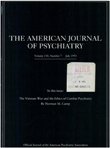REM latency and the recovery from depression: getting over divorce
Abstract
OBJECTIVE: The authors' goal was to address five questions: 1) What is the frequency of early REM sleep in subjects in the process of divorce who meet diagnostic criteria for major depressive disorder? 2) What is the frequency of this sign in subjects in the process of divorce who are not depressed? 3) How often does this sign persist following remission of depressive symptoms? 4) What is the predictive value of early REM sleep among depressed subjects for later adjustment to the process of divorce? and 5) What is the role of a family history of depression or alcoholism in the presence and persistence of early REM sleep? METHOD: Two hundred fourteen volunteers undergoing marital separation were recruited; 70 of these subjects were selected for a 3- night sleep study. Forty of the 70 subjects met criteria for depression and 30 did not; 61 (87%) returned for repeat studies 1 year later. RESULTS: Fifteen (38%) of the 40 depressed subjects had short REM latency. Seven of these continued to have short REM latency 1 year later, but none of these met the criteria for depression at that time. A higher proportion of these subjects had made a good adjustment to their new life than did depressed subjects whose initial and follow-up REM latencies fell within the normal range. CONCLUSIONS: These data suggest that depressed individuals with normal REM latency may need more aggressive treatment intervention.
Access content
To read the fulltext, please use one of the options below to sign in or purchase access.- Personal login
- Institutional Login
- Sign in via OpenAthens
- Register for access
-
Please login/register if you wish to pair your device and check access availability.
Not a subscriber?
PsychiatryOnline subscription options offer access to the DSM-5 library, books, journals, CME, and patient resources. This all-in-one virtual library provides psychiatrists and mental health professionals with key resources for diagnosis, treatment, research, and professional development.
Need more help? PsychiatryOnline Customer Service may be reached by emailing [email protected] or by calling 800-368-5777 (in the U.S.) or 703-907-7322 (outside the U.S.).



